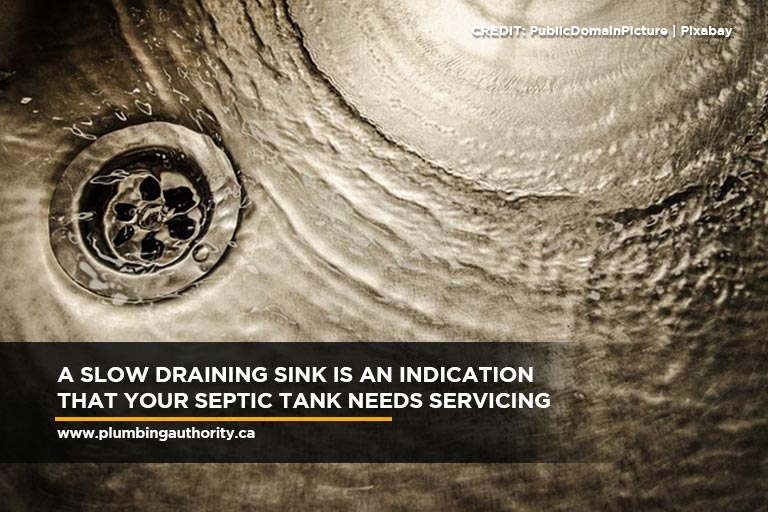
A septic tank is an underground, watertight chamber made of concrete, fibreglass, or polyethylene through which domestic wastewater (sewage) flows for basic treatment. It consists of a septic tank and a drain field. The septic tank stores liquid waste, breaks down organic matter through an anaerobic process and separates floatable matter, (grease and oils) and solids from household sewage.
As the septic tank continues to hold wastewater, its volume reduces. Disease-causing parasites and microorganisms can thrive in the wastewater accumulated in the tank. Exposure to wastewater can put your health and safety at risk.
To ensure your septic system can effectively and safely handle sewage and prevent various diseases, make sure that you have it regularly inspected, pumped and maintained by a professional. Never attempt any form of DIY septic tank care and maintenance.
Septic Tank Maintenance

The maintenance of a septic system goes beyond just pumping the system. It involves different tasks that go with the inspection and maintenance process to ensure that the septic system operates efficiently for a long time.
What are the tasks involved and the frequency needed to set up septic tank maintenance appointments? In this post, we will give you a quick overview of everything you need to know about septic tank maintenance.
- Inspect Your System
If you have a gravity system (a type of septic system consisting of a septic tank and drain field), it needs to be inspected at least once every 3 years, while other types of systems require inspection at least once a year.
Over time, solid waste (or sludge) builds up and comes near the outlet baffles of the septic tank. This causes solids to plug the pipe into the drain field or, even worse, cause clogging of the drain field.
Your local health agency may impose a more stringent septic tank inspection requirement. To oblige with the local health agency’s requirement, call a professional to do the inspection.
- Pump Your System
Do not wait to pump out the septic tank until you encounter a problem. Pump it out when needed. A typical household should pump its septic system every 2 to 3 years. Regular septic tank pumping service helps ensure the proper function of the tank and prevent potentially expensive failures, such as sewage backup and clogged drain field. Additionally, frequent use of garbage disposal can increase the volume of solid wastes in the tank, which can require more pumping.
Here are 4 significant factors that influence the frequency of pumping the septic tank:
- Household size: The more household members, the more frequently you will need to pump the tank.
- Volume of solids in wastewater: Dumping food scraps in the garbage disposal can fill the tank up quicker with solid waste.
- Total wastewater generated: Inefficient or leaky toilets, faucets, showerheads, and washers can increase the volume of wastewater in the tank.
- Septic tank size: Bigger tanks have more capacity to process solid waste and water, requiring less pumping.
Warning Signs Your Septic Tank Needs Servicing

Irregularly maintained septic systems show several tell-tale signs indicating that a potential problem is developing. Here are some of the most common warning signs to watch out for if you fail to have your septic tank pumped regularly.
- Sewage Backup
The most obvious sign of a failing septic tank is raw sewage backing up into your home. This nasty septic problem usually occurs when the tank is not pumped or inspected on a regular basis. You will find yourself dealing with this problem at some point if you continue to take for granted the maintenance of the septic tank. In case of a sewage backup, avoid the area and contact a septic tank service immediately. While having the tank pumped resolves the issue, the septic system will still require a thorough inspection to determine the cause of the problem. In case of a serious problem, septic tank repair may be required.
- Odour
As solid and wastewater continue to accumulate in the tank, the space for odour-causing gases becomes lesser. When this happens, unpleasant odours can emanate from your toilet or drains inside the house. Furthermore, these gases will emit through the drain fields, giving off a sewage smell around the outside of your home. If you start to notice a sulphurous odour lingering in and around your home, contact an emergency plumber to take care of the problems before it worsens.
- Sluggish Drains or Flushing
Another good indicator of a failing septic tank is when it starts to show signs of distress in the drains. One of the most common signs that your septic tank is starting to back up is that you will notice the sink, shower, or tub is not draining as quickly as it did before. The same happens to the toilet—its flushing efficiency starts to falter. If you notice sluggish drains or flushing, never ignore it. Take action before it turns something into a much serious and costly problem.
- Lush, Green Lawn Over Drain field
A well-functioning septic drain field should not make the grass above it look noticeably lusher and greener than the rest of the yard. If you notice a part of your lawn that is better than the surrounding areas, then it is a good indicator that there is something wrong with the drain field below it. When this happens, the grasses benefit from some extra fertilizer in the form of liquid waste products. Make sure to have the septic system inspected right away before it can turn your surroundings unsafe and hazardous.
The best solution to prevent nasty septic tank problems is to plan ahead and follow a regular septic tank inspection and pumping. Call a professional plumbing company to inspect and pump your septic system and ensure that it performs at its peak during the holidays, family reunions, and other special occasions.
If you are looking for a full-service plumbing company that offers septic system maintenance, contact Plumbing Authority. Our team of professional plumbers in King City have the right skills and equipment to handle any type of septic service and stop disasters from happening. Call us today at 647-992-7473 for a free on-site estimate or fill in our contact form to send us your message.




